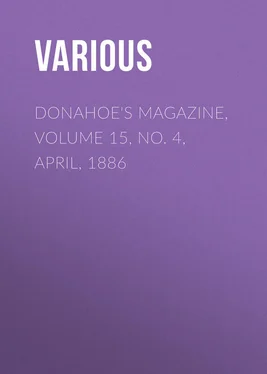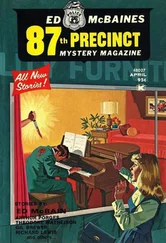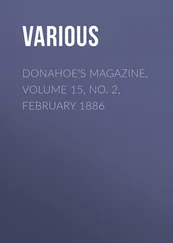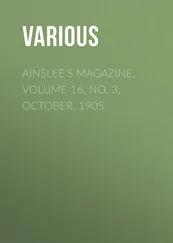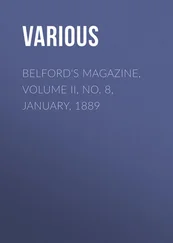Various - Donahoe's Magazine, Volume 15, No. 4, April, 1886
Здесь есть возможность читать онлайн «Various - Donahoe's Magazine, Volume 15, No. 4, April, 1886» — ознакомительный отрывок электронной книги совершенно бесплатно, а после прочтения отрывка купить полную версию. В некоторых случаях можно слушать аудио, скачать через торрент в формате fb2 и присутствует краткое содержание. Издательство: Иностранный паблик, Жанр: periodic, foreign_edu, на английском языке. Описание произведения, (предисловие) а так же отзывы посетителей доступны на портале библиотеки ЛибКат.
- Название:Donahoe's Magazine, Volume 15, No. 4, April, 1886
- Автор:
- Издательство:Иностранный паблик
- Жанр:
- Год:неизвестен
- ISBN:нет данных
- Рейтинг книги:5 / 5. Голосов: 1
-
Избранное:Добавить в избранное
- Отзывы:
-
Ваша оценка:
- 100
- 1
- 2
- 3
- 4
- 5
Donahoe's Magazine, Volume 15, No. 4, April, 1886: краткое содержание, описание и аннотация
Предлагаем к чтению аннотацию, описание, краткое содержание или предисловие (зависит от того, что написал сам автор книги «Donahoe's Magazine, Volume 15, No. 4, April, 1886»). Если вы не нашли необходимую информацию о книге — напишите в комментариях, мы постараемся отыскать её.
Donahoe's Magazine, Volume 15, No. 4, April, 1886 — читать онлайн ознакомительный отрывок
Ниже представлен текст книги, разбитый по страницам. Система сохранения места последней прочитанной страницы, позволяет с удобством читать онлайн бесплатно книгу «Donahoe's Magazine, Volume 15, No. 4, April, 1886», без необходимости каждый раз заново искать на чём Вы остановились. Поставьте закладку, и сможете в любой момент перейти на страницу, на которой закончили чтение.
Интервал:
Закладка:
But the fellow who couldn't "pop the question" to "a noble girl," would not deserve to get her, and we think the noble girl would say the same.
The above selections are by no means the best we could have given. They are selected at random, and chiefly because they admit of selection without injuring the sense of their meaning. In other instances it would have been necessary to quote the poems entire, and this, of course, was neither desirable nor practicable in the small space at command.
The author of these poems is not unknown in Boston and throughout the New England States. It would be an encouragement to her to find that her efforts were not without promise of reward, and confident we are that those who spend a dollar in purchasing this handsome volume will not regret it. We have all a duty to discharge in the encouragement of Catholic writers and here is an excellent chance.
The work is beautifully brought out by the spirited publishers, McGowan & Young, of Portland, Me. It is printed on the finest paper, well and handsomely bound, gold lettered and red edges. It has a dedication so brief and beautiful that we give it entire. It is a little poem in itself. Here it is: —
Were it possible to reveal even a little of what this abdication means, and what it conceals, the effort of Margaret E. Jordan would reap a rich return for literary labors performed under trying circumstances. Our beautiful singer could not well refrain from writing about "Gethsemane." Her devotion and her love to our Suffering Lord must needs find its vent among the trees of Mount Olivet!
Procure a copy of "Echoes from the Pines," and the sweet music and balsamic odor will be deliciously refreshing and grateful to every sense.
P. McC.Musings from Foreign Poets
The million-tinted pearl of ocean
Lies shrined within its mortal shell,
And sails the deep in wavy motion,
Responsive to each tidal swell.
These songs of mine that shell resemble
Freighted with tears, in ebb and flow,
Like to the shell they float and tremble
On the wild ocean of my woe.
While still a youth and all aflame
With fire poetic, I became
A pupil of the Muses nine;
One took my hand in kindly mood,
And led me to the inner shrine —
The secret workshop, where apart,
In silence and in solitude,
They wrought the marvels of their art.
The Muse then showed me, one by one,
And in minute detail outlined
The various tasks to each assigned;
I listened, marvelling much the while;
"Pray, Muse," I asked, "where is the file?"
She answered lightly as in scorn,
"The file is rusted and outworn,
'Tis used no more in prose or rhyme."
"But why not mend it if 'tis broken?"
Lightly again the words were spoken,
"The fact is, friend, we have no time!"
O Thou who dost thine ear incline
Unto the lowly sparrow's nest,
And hear'st the sighs of flowers that pine
For dews upon the mountain's crest!
Divine Consoler of our woes!
Thou dost the hidden hand perceive
That on the poor a coin bestows
To buy the bread by which they live.
Thou givest, as Thou deemest best
To mortals, wealth or poverty,
That, springing from their union blest,
Justice might live and charity.
To know the hearts, be this Thy care,
Who thus their kindly gifts dispense,
That in the treasures they may share
Of Thy all-bounteous providence.
We know not those for whom we pray,
They are beheld of Thee alone;
Their right hand's gifts from day to day,
Are ever to their left unknown.
The plan to unite Paris and London with pneumatic tubes has been reported on favorably by French engineers, and submitted to the Government. It is proposed that two pneumatic tubes be laid, following the line of the Northern Railroad from Paris to Calais, thence across the channel to Dover, and following the line of the South-Eastern Railroad to London. Letters could thus be transmitted between the two capitals in one hour. Wagonets like those now used to transport telegrams from Paris are used, weighing ten kilograms and capable of carrying five kilograms weight of mail matter. Twenty pneumatic trains are to be started every hour.
Erin on Columbia's Shore
That history repeats itself in many and sometimes mysterious ways, is rather interestingly illustrated in a talk with Mr. Denis McGillicuddy, of Medford. This gentleman emigrated from Ireland to America about forty years ago, and in the meantime has been a prominent builder and contractor. His works include the construction of nineteen Catholic Churches, among them in 1870-1, St. Augustine's Church of South Boston, and also the mansion of Archbishop Williams and his priests near the Cathedral in this city. His story links two countries together in its detail, though centuries and three thousand miles of ocean divide them, and the incidents he related yesterday to the writer, as follows:
"When I read the account of the truly Christian celebration of Christmas in St. Augustine's Church, South Boston, it brought to my mind an incident in connection with the building of that beautiful and elaborately finished edifice and its worthy pastor, Rev. Father O'Callaghan, which I should think might very well interest the general reader; but it certainly ought to be interesting to those who familiarize themselves with comparisons in history. Among the artisans employed on St. Augustine's, when in process of erection, were four men bearing the historic names of O'Keefe, O'Sullivan, O'Falvey and O'Connell. Now, sir, in the Annals of Ireland, by the Four Masters, we find that Ceallachan (Callaghan), a celebrated warrior of the Erigenian race, was King of Cashel in the tenth century, and having defeated the Danes in several battles, Sitric, who was then chief of the Danes, in Dublin, made proposals of peace to the King of Munster. Ceallachan went to Dublin on that mission accompanied only by his body-guard, and one or two friends. On his arrival there, his party was treacherously attacked, and Ceallachan was taken prisoner, – the entire proceedings, on the part of the barbarians being a conspiracy to get Ceallachan, their formidable opponent, into their power. The Munster (South of Ireland) chiefs, in order to release their king from captivity, collected a powerful force, numbering over twelve thousand troops commanded by Denis O'Keefe, Prince of Fermoy, and O'Sullivan, Prince of Beara. They also organized a large naval force, consisting of one hundred and twenty ships commanded by an O'Falvey and an O'Connell.
"The army marched northwest through Connaught, and thence through Ulster to Armagh, which city was then in possession of the Danes, and whither the latter had brought Ceallachan to transport him captive to Denmark. The Irish attacked Armagh, applied scaling ladders to the walls, and the Danes under Sitric and his brothers, Tor and Magnus, were defeated with great slaughter. The Danes fled in the night to the protection of their ships at Dundalk, and carrying Ceallachan, they embarked on board their vessels in that bay. Warrior O'Keefe followed, and from its shores sent a flag of truce demanding of Sitric that he deliver to him the person of King Ceallachan. But Sitric refused the demand unless an eric, a sum of money, was first paid for every Dane who fell in the fifteen different battles with King Ceallachan and his forces. Sitric then ordered Ceallachan to be tied to one of the masts of his ship, and he was thus exposed in full view of the whole Munster army. The Irish were terribly enraged at this outrage on their chief, but had not then any means of attacking the enemy. Shortly after, however, O'Falvey, the Irish admiral, hove in sight and drew up his ships in line for attack on the Danish fleet. A desperate engagement ensued; the Irish commanders gave orders to grapple with the enemy's vessels. O'Falvey succeeded in releasing Ceallachan, and, giving him a sword, asked him to assume command. The Irish, at seeing their king at liberty, fought with renewed valor; but the valiant O'Falvey fell pierced with many wounds. O'Connell, who was second in command, seized Sitric, the Danish chieftain, in sudden grasp and plunged overboard with him. Both were drowned. It is also related that Fingal, and many other Irish chiefs, grasped other Danish chiefs in similar fashion in their arms, and leaped with them in like manner into the sea. At length, the Danish forces were defeated, and their fleet totally destroyed. Almost all the Irish chiefs and a great many of the men engaged in that hard contest were slain. The consternation of General O'Keefe and his army, being unable to render any assistance to their countrymen on the water, may be imagined. After the naval combat Ceallachan landed in Dundalk, where he was most joyfully received by the people, and soon after resumed in peaceful sway, the government of the Munster province."
Читать дальшеИнтервал:
Закладка:
Похожие книги на «Donahoe's Magazine, Volume 15, No. 4, April, 1886»
Представляем Вашему вниманию похожие книги на «Donahoe's Magazine, Volume 15, No. 4, April, 1886» списком для выбора. Мы отобрали схожую по названию и смыслу литературу в надежде предоставить читателям больше вариантов отыскать новые, интересные, ещё непрочитанные произведения.
Обсуждение, отзывы о книге «Donahoe's Magazine, Volume 15, No. 4, April, 1886» и просто собственные мнения читателей. Оставьте ваши комментарии, напишите, что Вы думаете о произведении, его смысле или главных героях. Укажите что конкретно понравилось, а что нет, и почему Вы так считаете.
